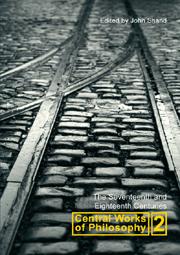
- This book is no longer available to purchase from Cambridge Core
- Publisher:
- Acumen Publishing
- Online publication date:
- February 2013
- Print publication year:
- 2005
- Online ISBN:
- 9781844653591
- Subjects:
- Early Modern Philosophy, Philosophy
Our systems are now restored following recent technical disruption, and we’re working hard to catch up on publishing. We apologise for the inconvenience caused. Find out more: https://www.cambridge.org/universitypress/about-us/news-and-blogs/cambridge-university-press-publishing-update-following-technical-disruption

CENTRAL WORKS OF PHILOSOPHY is a multi-volume set of essays on the core texts of the western philosophical tradition. From Plato's Republic to the present day, the volumes range over 2,500 years of philosophical writing covering the best, most representative, and most influential work of some of our greatest philosophers. Each essay has been specially commissioned and provides an overview of the work and clear and authoritative exposition of its central ideas. Volume 2 examines the brilliant outpouring of philosophical thought that characterised the seventeenth and eighteenth centuries and which gave rise to the influential traditions of rationalism and empiricism. The book begins with Descartes's Meditations on First Philosophy, which for the first time put forward the view that knowledge of the world is obtained through pure reason alone and in so doing marked the start of the modern period in the history of philosophy. The volume then examines two further texts in the rationalist tradition: Spinoza's Ethics, which builds Descartes's concepts into a consistent metaphysical theory with ethical consequences, and Leibniz's The Monadology, which explores what must be the ultimate nature of reality if the world is to be fully explained. Three landmark works of empiricist philosophy are considered: Locke's An Essay Concerning Human Understanding, which argues that we must make knowledge ours through experience and not authority; Berkeley's attack on materialism in his A Treatise Concerning the Principles of Human Knowledge and Hume's search for rational justification for our most basic beliefs about the world in his A Treatise of Human Nature. In addition, the book also includes chapters on two of the seminal works of moral and political philosophy of the period: Hobbes's masterpiece, Leviathan, which reminds us of the dangers of the unchecked brutality of human nature, and Rousseau's The Social Contract, a vision of how human nature may be changed for the better in a new society.
"A very readable and highly engaging introduction to early modern philosophy. Each essay leads the reader through a major work of one early modern philosopher, with special emphasis on their views about science, epistemology and metaphysics, and provides a useful overview of early modern ethical and political thought as well."
Steven Horst
 Loading metrics...
Loading metrics...
* Views captured on Cambridge Core between #date#. This data will be updated every 24 hours.
Usage data cannot currently be displayed.